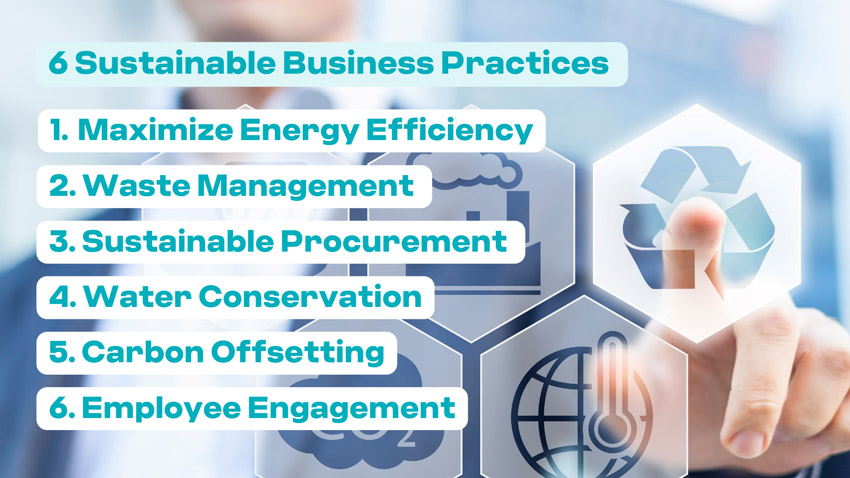Increasing concern for environmental challenges is something that is affecting all businesses around the world today. Climate change, deforestation, biodiversity loss, and pollution are just a handful of the many environmental issues we face today.
The business sector is critical to tackling these concerns since it accounts for a major share of global greenhouse gas emissions and other environmental impacts. As a result, it is becoming increasingly essential for companies to embrace sustainable practices that lower their environmental footprint and contribute to the protection of the world for future generations.
6 Sustainable Practices for your Business
Sustainable business practices are those that strike a balance between economic, social, and environmental concerns. By adopting these practices, businesses can reduce their negative impact on the environment, improve their reputation, and enhance their competitiveness in the long term. Moreover, sustainable business practices can also help to create new opportunities and markets, increase productivity, and reduce costs.

Maximize Energy Efficiency
One of the simplest and most effective ways for a business to reduce its environmental impact is by implementing energy-efficient technologies and practices. For instance, replacing traditional lighting systems with LED lights, using energy-efficient appliances, and incorporating renewable energy sources into the business operations can significantly reduce a business’s energy consumption and carbon footprint.
Waste Management
Waste management is a crucial aspect of sustainable business practices, and it plays a vital role in minimizing a business’s environmental impact. By adopting waste reduction, recycling, and composting programs, businesses can significantly reduce the amount of waste they generate and make a positive impact on the environment.
"In general, use less #plastic. Especially, #reduce our personal #consumption of disposable plastic. Government and business––and society in general––need to undergo systemic changes." https://t.co/mcxo34I98R
— Ecofriendly Beer Drinker (@EcofriendlyBeer) February 5, 2023
Sustainable Procurement
Considering sustainability along your procurement supply chain is another essential aspect of sustainable business practices, and it involves making responsible choices when buying products and services. By prioritizing environmentally friendly and socially responsible products and suppliers, businesses can significantly reduce their environmental footprint and promote sustainable practices throughout their supply chain.
Water Conservation
Water conservation involves implementing technologies and practices that reduce water usage and conserve this precious resource. By adopting water-saving technologies and practices, businesses can significantly reduce their water consumption and play an important role in conserving this vital resource for future generations.
Carbon Offsetting
Carbon offsetting allows businesses to compensate for their direct, and indirect, carbon emissions by investing in renewable energy and other carbon reduction projects. By offsetting their carbon emissions, businesses can reduce their carbon footprint and play an important role in mitigating their impact on the environment.
Employee Engagement
Encouraging your employees to adopt environmentally friendly habits in the workplace is a great place to start your company’s green shift. Businesses can implement an employee engagement program that encourages employees to adopt sustainable practices, such as using public transportation, reducing energy consumption, and recycling. These efforts help to create a more environmentally friendly workplace and engage employees in the company’s sustainability efforts.
How to become a NET-ZERO company
While businesses can adopt a variety of sustainable practices to minimize their impact on the environment, it is important to recognize that it may not always be possible to achieve a net-zero carbon footprint. This is where carbon offsetting comes into play.
Carbon offsetting is a way for businesses to compensate for their remaining emissions by investing in renewable energy and other carbon reduction projects. By offsetting their carbon emissions, businesses can reduce their carbon footprint and play an important role in mitigating their impact on the environment, even if they are not able to achieve net-zero emissions. Reduce your carbon footprint through our portfolio of verified carbon offset projects.




